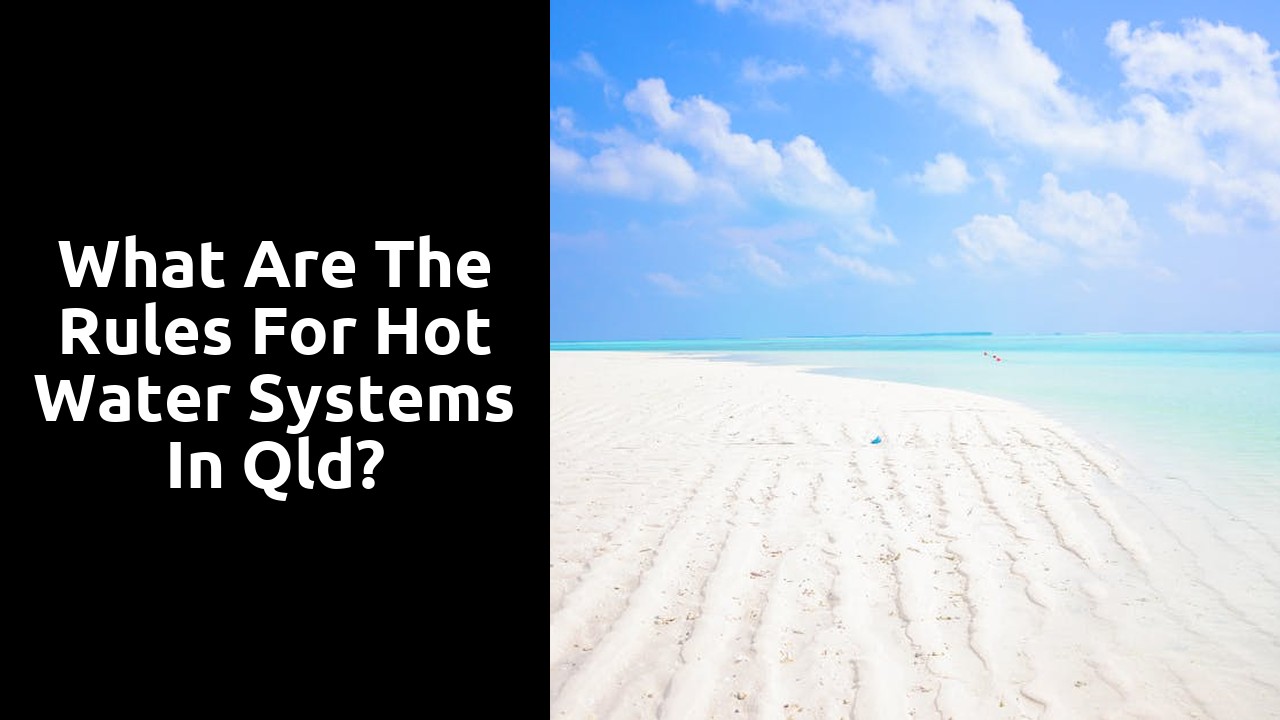
Insurance Requirements for Hot Water System Installation
Insurance requirements for hot water system installation in Queensland are crucial for ensuring the safety and compliance of residential and commercial properties. Property owners must adhere to specific guidelines to protect against potential risks and liabilities. Failure to meet these insurance requirements can result in serious consequences and financial losses. When installing a hot water system, especially solar hot water system design and installation, property owners must verify that they have adequate liability coverage. This coverage helps safeguard against any property damage or personal injury that may occur as a result of the hot water system installation process.
It is essential for property owners to fully understand the insurance requirements related to solar hot water system design and installation in Queensland. By obtaining the necessary insurance coverage, property owners can mitigate potential risks and ensure a smooth installation process. In the event of any unforeseen incidents or accidents during the installation of a hot water system, having the right insurance coverage can provide the financial protection needed to address any liabilities that may arise. Proper insurance coverage is a vital component of complying with the regulations governing hot water system installations in Queensland.
Liability Coverage
When it comes to liability coverage for hot water systems in Queensland, it's crucial to understand the requirements set forth to protect both consumers and service providers. For all installations of hot water systems, including Solar Hot Water System Design and Installation, adequate liability coverage is essential. This coverage serves as a safeguard in case of any damage, injury, or malfunction related to the hot water system, ensuring that all parties involved are protected in the event of an unforeseen incident.
The regulations in Queensland emphasize the importance of having liability coverage specifically tailored for hot water system installations. Whether it's a traditional electric hot water system or a cutting-edge Solar Hot Water System Design and Installation, having the appropriate coverage not only aligns with legal requirements but also instills confidence in consumers regarding the competence and professionalism of the service provider. By upholding these insurance standards, the industry can maintain high-quality standards and uphold the integrity of hot water system installations across the state.
Disposal Regulations for Old Hot Water Systems
Proper disposal of old hot water systems is crucial to ensure safety and environmental protection. In Queensland, guidelines have been established to regulate the disposal of these systems. When replacing an old hot water system, it is necessary to follow these regulations to avoid any legal consequences.
The disposal of old hot water systems should be done in accordance with the specific guidelines outlined by local authorities. It is important to consider proper recycling methods to reduce the impact on the environment. Solar hot water systems are gaining popularity due to their energy efficiency and eco-friendliness; hence, it is even more critical to adhere to disposal regulations when replacing traditional systems with Solar Hot Water System Design and Installation.
Proper Recycling Methods
When it comes to the proper disposal of old hot water systems in Queensland, it is essential to consider the environmental impact and implement responsible recycling practices. Upon removal, it is crucial to ensure that all components are separated and sent to appropriate recycling facilities to prevent any harmful substances from entering the environment. Collaborating with licensed waste disposal companies can ensure that the recycling process adheres to regulations and minimises the system's negative impact on the environment. Solar hot water system design and installation play a significant role in reducing the need for traditional water heating methods, thereby contributing to a more sustainable future for Queensland.
The State government encourages individuals and businesses alike to embrace eco-friendly practices when disposing of old hot water systems. By engaging in responsible recycling methods, such as separating materials like copper, steel, and glass from the system, individuals can contribute to reducing waste and conserving valuable resources. Furthermore, promoting the use of solar hot water system design and installation not only supports environmental sustainability but also helps in minimising energy consumption, making it a win-win solution for both the community and the planet.
Penalties for Noncompliance with Hot Water System Rules
Penalties for noncompliance with hot water system rules in Queensland can be severe. Individuals or businesses failing to adhere to the regulations set forth by the state may face fines and legal consequences. It is imperative to obey these rules to ensure the safety and efficiency of hot water systems across the region, including solar hot water system design and installation.
The Queensland government enforces these regulations to protect both consumers and the environment. Fines for not complying with the rules regarding hot water systems can vary depending on the severity of the violation. Legal repercussions may also be enforced, highlighting the importance of following the guidelines for proper installation and disposal of hot water systems, especially those utilising solar technology.
Fines and Legal Consequences
Fines and legal consequences for non-compliance with hot water system rules in Queensland can vary depending on the severity of the violation. Individuals or companies who fail to adhere to regulations related to hot water systems may face substantial penalties. These penalties serve as a deterrent to ensure that all installations, including Solar Hot Water System Design and Installation, meet the required standards set forth by the authorities.
In Queensland, fines for breaching hot water system rules can range from financial penalties to legal actions. It is crucial for individuals and businesses involved in the design and installation of hot water systems, such as Solar Hot Water System Design and Installation, to understand and follow the rules diligently to avoid facing fines and potential legal proceedings. Adhering to the regulations not only helps in avoiding fines but also ensures the safety and efficiency of the hot water systems, benefitting both the consumers and the environment.
FAQS
What insurance requirements are needed for hot water system installation in Queensland?
It is mandatory for all hot water system installers in Queensland to have public liability insurance to protect both the installer and the consumer in case of any accidents or damages during the installation process.
How can I ensure that the hot water system installation is covered by liability insurance?
Before hiring any hot water system installer in Queensland, make sure to ask for proof of their public liability insurance to ensure that you are protected in case of any unforeseen incidents.
What are the disposal regulations for old hot water systems in Queensland?
It is important to properly dispose of old hot water systems in Queensland by following the recommended recycling methods to ensure environmental sustainability and compliance with regulations.
What are the proper recycling methods for old hot water systems in Queensland?
The proper recycling methods for old hot water systems in Queensland include taking them to approved recycling facilities or contacting a licensed waste disposal company to handle the recycling process responsibly.
What are the penalties for non-compliance with hot water system rules in Queensland?
Non-compliance with hot water system rules in Queensland can result in fines and legal consequences, so it is important to follow all regulations and guidelines to avoid any penalties or sanctions.
